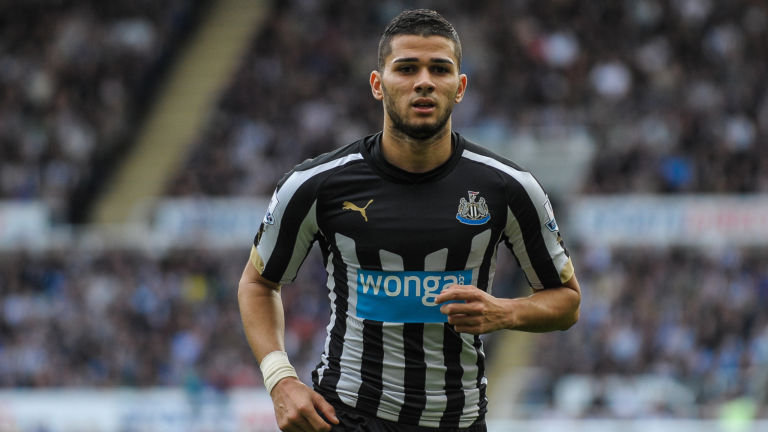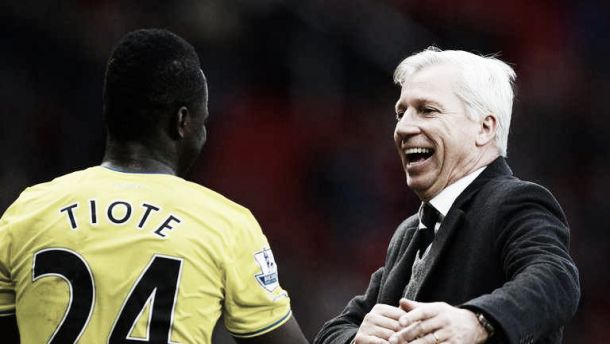Since leaving Newcastle United for his beloved Crystal Palace in December last year, Alan Pardew has gone on to show that he perhaps has some managerial capabilities that Newcastle fans maybe didn't give him credit for.
Nevertheless, there are still plenty of reminders lingering around the club to suggest that the Magpies are still better off without Pardew at the helm, chiefly in the form of underdeveloped talent.
During his time at St James's Park, Pardew coached plenty of young, promising individuals, yet his poor man-management skills and his inability to get the most out of players has had a crippling effect on their once bright-looking futures.
The curious case of Mapou Yanga-Mbiwa
In no other case is this as clear as that of Mapou Yanga-Mbiwa, who fortunately managed to get his career back on track following his struggles under Pardew's Newcastle. The young frenchman joined the Magpies after a season spent captaining Montpellier to the Ligue 1 championship and looked as if he would settle in nicely at the heart of Newcastle's defence.
However, he mostly found himself being deployed out of position or sitting on the bench watching either Mike Williamson or Steven Taylor struggling in a position he is very capable of performing in. His record as part of last season's Roma back line provides evidence to suggest he was highly under-appreciated and his lack of development at Newcastle wasn't just down to personal issues.
Whilst Yanga-Mbiwa has since gone on to progress comfortably elsewhere, there are those whose careers have been stifled so much that finding opportunities elsewhere is proving to be a difficult proposition.
When Chris Hughton brought Cheick Tiote to Newcastle in 2010, the Ivorian looked a perfect fit at the heart of midfield and on his debut even had a 100% pass completion rate. Roll the clock forward five years and post-Pardew Tiote is a much different player.
The once composed, solid 22-year-old has become something of a liability and now struggles to get into the starting line-up. For a player who was once valued over the £20m mark to have fallen so far demonstrates a drastic change in circumstances and Pardew's input has to be taken into account.
The arrivals of Yoan Gouffran and Moussa Sissoko
Other clear examples exist of players arriving full of hope and vigour, only to seem a shadow of themselves a short while down the line. Yoan Gouffran looked like an absolute steal when he first arrived and seemed to be scoring goals for fun. Now when considering his striking, the words barn door and banjo spring to mind, with his talents having seemingly deserted him of late.
Gouffran joined the club at exactly the same time as Moussa Sissoko, whose debut against Chelsea was a scintillating display of attacking football. However two seasons on, Newcastle fans were wondering what had happened to the ebullient powerhouse who'd lit up St James's park that evening, as the French international looked incapable of producing the performances the fans had come to expect from him.
Another whose fortunes faded under Pardew was former Coventry midfielder Gael Bigirimana, who looked a solid acquisition in his first season. Yet he has barely graced the first team since then, has been loaned out to Rangers and now looks to be permanently moving on from Newcastle, where his talents have been left to waste away.
The number of players who should have produced more than they have for Newcastle United is staggering to put it kindly. The aformentioned cases are but a few from a list to which the names Davide Santon, Haris Vuckic, Massadio Haidara, Remy Cabella, Emanuelle Riviere, Sammy Ameobi, Mehdi Abeid, Sylvain Marveux, Roman Amalfitano, Adam Armstrong and perhaps even a few others could be added.
The cause of this waste of talent can be found down one of either two roads. Blame the players themselves for not putting in the requisite effort, or look at the common denominator of the club in charge of their development.
So, whose fault is it?
The sheer amount of players not achieving their full potential provides sufficient evidence to suggest Newcastle United is the cause and Alan Pardew, the man who the successes of the football club were entrusted to over the past few years has to be held partly, if not fully accountable.
In the wake of his departure now lies a club with players whose careers have stagnated under his guidance and it is up to Steve McClaren to once again get the best out of players who have no doubt suffered under poor man-management and tactical inadequacy.
For some it could possibly be too late. Abeid is on his way to Panathanaikos for £1.5 million, despite previously being touted as a future club captain, whilst Vuckic seems desperate to find a role at another club that might help him grow and develop as he should.

In the past few years the amount of players who have arrived at Newcastle and underachieved is simply unforgivable. The fact that the club still sometimes fields the same centre back pairing it had in a lower league six seasons ago, despite no fewer than 13 different defenders being registered as first team players with the club since then, demonstrates an abysmal ability to further careers of those with potential.
This torrid track record needs to be addressed and then significantly improved upon, lest Newcastle end up with further generations of unusable players. After all, spending money on potential future stars only to leave them bereft of vital support harms the club just as much as it does the individuals and for the sake of both, it is imperative that a good development system is implemented.
Without such a system, Newcastle will continue to exist solely as the conveyorbelt it currently is, with players coming and going and the club never truly improving. Pardew's loathesome legacy of under-development still lingers and the players left struggling in its wake need to be seen as examples of what not to do for the current generation, in order to create a stronger, more competitive club for the future.










































